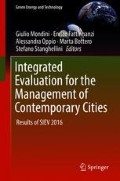Abstract
The Encyclical Letter “Laudato Sì” (“Praise be to you”) gives space to an important reflection on the social and environmental development dimensions as well on the relationship between economic growth and human progress. The Letter proposes an explicit critique to the current economic system, based on the neoclassical paradigm, and it claims some not strictly traditional economic issues. Starting from this critical analysis, the Letter offers an in-depth reflection that moves from the decisions making processes and the objectives of economic policies up to the evaluation tools, which should be able to support an effective care of the Earth, dubbed as a “Common Home”. In order to overcome prejudices and the traditional perspectives and to seriously tackle the environmental and social challenges, the Encyclical Letter tries to broaden the concepts of value and progress. There are several causes for reflection: from the critique to methodological individualism (and the consequent representation of choices based on preferences not structured as needs) to the lack of recognition of the special harmony between humans and nature. Similarly to the Marxian thought of men’s alienation, it underlies the identity value of places, so to make the reduction of environmental and public goods to mere commodities controlled by the market unacceptable. The answer to this challenge cannot be vague ecology. For this reason the Letter calls for a new definition of the relationship between human beings and nature, starting from the Judeo-Christian anthropocentrism, which recalls that kind of reciprocity and which doesn’t assign to man the role of lord of the universe, but rather of responsible administrator. This new definition is based on some deep-rooted principles: the limits of resources and technology’s power, the social limits of affluent societies, the acceptance of the steady state condition, the attention to diversities, capabilities, willingness to participate by local communities, the individual character of well-being and life projects, the exhortation for a distributive justice into and between generations. The change of paradigm should be radical and subjected to mediation. In this framework the Encyclical Letter assigns to the Appraisal discipline a fundamental role for pursuing the envisaged changes and it outlines some operational assumptions to make the evaluation activities a real support to policy making.
Access this chapter
Tax calculation will be finalised at checkout
Purchases are for personal use only
References
Address to Indigenous and Rural People, Cuilapán, Mexico (29 Jan 1979), 6: AAS 71 (1979), 209
Anelli F (2016) La natura come creazione e le responsabilità dell’uomo, in «Vita e Pensiero»
Bator F (1958) The anatomy of market failure, in «Q J Econ» 72(3):351–379
Bottero M, Mondini G, Oppio A (2016) Decision support systems for evaluating urban regeneration. In Procedia: social and behavioural sciences, vol 223, pp 923–928. ISSN:1877-0428. https://doi.org/10.1016/j.sbspro.2016.05.319
Boulding KE (1996) The economics of the coming spaceship earth. In Jarrett H (ed) Environmental quality in a growing economy. Resources for the future/Johns Hopkins University Press, Baltimore, MD, pp 3–14s
Brundtland GH (1989) Our common future: the world commission on environment and development. Oxford University Press, New York
Georgescu-Roegen N (1971) The entropy law and the economic process. Harvard University Press, Cambridge
Guardini R (1984) La fine dell’epoca moderna. Morcelliana, Brescia
Hirsch F (1977) Social limits to growth. Routledge and Kegan Paul, London
Holy Father Francis (2015) Laudato si’… sulla cura della casa comune. Custodire la terra, coltivare l’umano, Società Cooperativa Sociale Frate Jacopa, Roma, avialable at https://w2.vatican.va/content/francesco/en/encyclicals/documents/papa-francesco_20150524_enciclica-laudato-si.html
Jonas H (1990) Das Prinzip Verantwortung (trad. it. a cura di Portinaro PP Il principio responsabilità. Un’etica per la civiltà tecnologica, Einaudi, Torino)
Marx K (1887) Capital, vol I (trans: Moore S, Aveling E). Sonnenschein, London
Meadows DH, Meadows DL, Randers J, Behrens W III (1972) The limits to growth. A report for the club of rome’s project on the predicament of mankind. Universe Books, New York
Mondini G (2016) Integrated assessment for the management of new social challenges. Valori e Valutazioni 17:15–18
Oppio A, Torrieri F (2018) Public and private benefits in urban development agreements, Green energy and technology. Springer, Berlin
Ostrom E (1990) Governing the commons: the evolution of institutions for collective action. Cambridge University Press, Cambridge
Pareglio S (2016) Il Valore dell’ambiente commune. In: Giuliodori C, Malavasi P (eds) Ecologia Integrale. Laudato Si’. Ricerca, Formazione, Conversione, Vita e Pensiero, Milano
Pearce D, Turner R (1990) Economics of natural resources and the environment. Harvester Wheatsheaf, London, UK
Penza G (2016) Pope Francis: The Laudato si’ encyclical and the urban issue. Valoro e Valutazioni 17:5–8
Rawls J (1971) A theory of justice. Harvard University Press, New York
Sen AK (1982) Choise, welfare and measurement. Basic Blackwell, Oxford
Sen AK (1985) Commodities and capabilities. North-Holland, Amsterdam
Sen A, Stiglitz J, Fitoussi JP (2009) Report by the commission on the measurement of economic performance and social progress. http://www.insee.fr/fr/publications-et-services/dossiers_web/stiglitz/doc-commission/RAPPORT_anglais.pdf. Accessed on December 2017
Smith A (1776) An inquiry into the nature and causes of the wealth of nations, vol I, Book V, Sect II
Tiezzi E (1984) Tempi storici, tempi biologici. La Terra o la morte: i problemi della “nuova ecologia”, Garzanti, Milano
Voogd H (1983) Multicriteria evaluation for urban and regional planning. Pion Ltd, London
VV.AA. (2016) Laudato si’. Un aiuto alla lettura, Libreria Editrice Vaticana, Città del Vaticano
VV.AA. (2016) Nature 530(7591)
Author information
Authors and Affiliations
Corresponding author
Editor information
Editors and Affiliations
Rights and permissions
Copyright information
© 2018 Springer International Publishing AG, part of Springer Nature
About this paper
Cite this paper
Pareglio, S., Oppio, A. (2018). The Value of Our Common Environment. In: Mondini, G., Fattinnanzi, E., Oppio, A., Bottero, M., Stanghellini, S. (eds) Integrated Evaluation for the Management of Contemporary Cities. SIEV 2016. Green Energy and Technology. Springer, Cham. https://doi.org/10.1007/978-3-319-78271-3_39
Download citation
DOI: https://doi.org/10.1007/978-3-319-78271-3_39
Published:
Publisher Name: Springer, Cham
Print ISBN: 978-3-319-78270-6
Online ISBN: 978-3-319-78271-3
eBook Packages: EnergyEnergy (R0)

